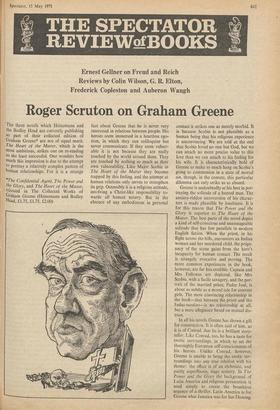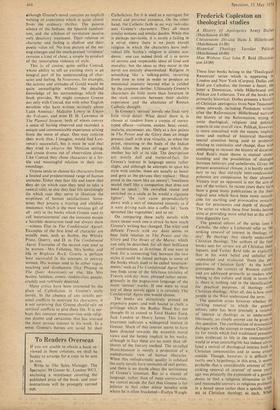THE SPECTATOR REVIEWaBOOKS
Ernest Gellner on Freud and Reich Reviews by Colin Wilson, G. R. Elton, Frederick Copleston and Auberon Waugh
Roger Scruton on Graham Greene
The three novels which Heinemann and the Bodley Head are currently publishing as part of their collected edition of Graham Greene* are not of equal merit. The Heart of the Matter, which is the most ambitious, strikes one on re-reading as the least successful. One wonders how much this impression is due to the attempt to portray a relatively complex pattern of human relationships. For it is a strange *The Confidential Agent, The Power and the Glory, and The Heart of the Matter, reissued in The Collected Works of Graham Greene (Heinemann and Bodley Head, £1.75, £1.75, £2.00) fact about Greene that he is never very interested in relations between people. His heroes seem immersed in a heartless ego- tism, in which they can soliloquise but never communicate. If they seem vulner- able it is not because they are really touched by the world around them. They are touched by nothing so much as their own vulnerability. Like Major Scobie in The Heart of the Matter they become trapped by this feeling, and the attempt at human relations only serves to strengthen its grip. Ostensibly it is a religious attitude, involving a Christ-like responsibility to- wards all human misery. But in the absence of any embodiment in personal contact it strikes one as merely morbid. It is because Scobie is not plausible as a human being that his religious experience is unconvincing. We are told at the end that Scobie loved no one but God, but we can attach no more precise value to this love than we can attach to his feeling for his wife. It is characteristically bold of Greene to make so much hang on Scobie's going to communion in a state of mortal sin, though, in the context, this particular dilemma can only strike us as absurd.
Greene is undoubtedly at his best in por- traying the solitude of a hunted man. The anxiety-ridden introversion of his charac- ters is made plausible by loneliness. It is for this reason that The Power and the Glory is superior to The Heart of the Matter. The best parts of the novel depict a kind of self-conscious and unassuageable solitude that has few parallels in modern English fiction. When the priest, in his flight across the hills, encounters an Indian woman and her murdered child, the poign- ancy of the scene gains from the hero's incapacity for human contact. The result is strangely evocative and moving. The more common experiences in the book, however, are far less credible. Captain and Mrs Fellowes are depicted, like Mrs Scobie, with a facile savagery, and the por- trait of the married priest, Padre Jose, is about as subtle as a moral tale for convent girls. The most convincing relationship in the book—that between the priest and the Judas-mestizo--is no relationship at all, but a mere allegiance based on mutual dis- trust.
In all his novels Greene has shown a gift for construction. It is often said of him, as it is of Conrad, that he is a brilliant story- teller. Like Conrad, too, he has a taste for exotic surroundings, in which to set the thoroughly European self-consciousness of his heroes. Unlike Conrad, however, Greene is unable to bring the exotic sur- roundings into any true relation with his theme: the effect is of an elaborate, and partly superfluous, stage scenery. In The Power and the Glory the background of Latin America and religious persecution is used simply to create the breathless urgency of a thriller. Latin America is for Greene what Jamaica was for Ian Fleming,
although Greene's novel contains an implicit valuing of experience which is quite absent from the ordinary thriller. The passive silence of the Indians, the Spanish fainéant- ism, and the nihilism of revolution receive only desultory treatment. Their relation to character and feeling is shallow and their poetic value nil. No true picture of the set- ting emerges and the much-praised 'vividness' remains a kind of cheat, a simple by-product of the remorseless violence of style.
This is, of course, quite unlike Conrad,, whose ability to tell an exciting story is an integral part of his understanding of char- acter and feeling. In Nostronto, for example, the actions and attitudes of Gould would be quite unintelligible without the detailed knowledge of his surroundings which the book provides. We might compare Greene not only with Conrad, but with other English novelists who have written seriously about Latin America : Malcolm Lowry in Under the Volcano, and even D. H. Lawrence in The Plumed Serpent, both of whom convey a sense of having observed and recorded a unique and communicable experience arising from the sense of place. One may criticise their work (few, imagine, would find Law- rence's successful), but it must be said that they tried to observe the Mexican setting, and create drama out of observation alone. Like Conrad they chose characters in a fer- tile and meaningful relation to their sur- roundings.
Greene tends`to choose his characters from a limited and predetermined range of human attitudes. Either they fear life and know that they do (in which case they tend to take a central role), or else they fear life unwittingly (in which case they serve to illustrate the emptiness of human satisfactions). Some- times they possess a trusting and childlike innocence, which is the most noxious gift of all : only in the books which Greene used to call 'entertainments' can the innocent escape a horrible destruction (and not always there —witness Else in The Confidential Agent). Examples of the first kind of charaCter are usually men, such as Scobie. the Whisky Priest, Querry. and D. in The Confidential Agent. Examples of the second type tend to be women—Mrs Fellowes, Mrs Scobie, and Ida in Brighton Rock. Greene is perhaps least successful in his attempts to portray women. His women tend to be either vague. touching and diaphanous (like Phuong in ?'he Quiet American); or else, like Mrs Scobie. helpless, empty. middle-class people, crudely and ruthlessly depicted.
Many critics have been interested by the place of Catholicism in Greene's early novels. In the absence of any strictly per- sonal conflicts to motivate his characters. it is not surprising that Greene should rely on spiritual conflicts to give them life. It is ner- haps this constant preoccungtion with religi- ous doubts and certainties that has aroused the most serious interest in his work. In a sense Greene's heroes are saved by their Catholicism, for it is used as a surrogate for moral and personal existence. On the other hand, the Catholic faith in no way individu- ates Greene's characters. They all share similar notions and similar doubts. While this is perhaps inevitable, it is surely a failing in a novel where there is no point except religion in which the characters have indi- vidual life. Scobie's religion is almost aca- demic: one can indeed think of it in terms of serious and respectable ideas of God and morality, but the ideas as they occur in the novel are entirely disembodied. Religion is something like a talking-pdint, recurring from time to time in order to produce an emotional intensity beyond what is yielded by the common thriller. Ultimately Greene's characters do little more than luxuriate in the stark contrasts between their shabby experience and the absolutes of Roman Catholic thought.
In Greene's 'serious' novels one finds very little vivid detail. What detail there is, is chosen at random from a corpus of stereo- typed effects—vultures, snakes, heat, sweat, malaria, excrement, etc. Only at a few points in The Power and the Glory does an image present itself with true vivacity, as when the priest, returning to the body of the Indian child, takes the piece of sugar which the mother has left at its side. The descriptions are mostly dull and matter-of-fact, for Greene's interest in language seems rather slight, and although he attempts to spice his style with similes. these are usually as banal and grey as the phrases they replace : 'Heat stood in the room like an enemy'; 'loneliness seated itself like a companion that does not need to speak': 'He swivelled round and switched on a smile as he would a cigarette lighter; 'the rain came perpendicularly down with a sort of measured intensity as if it were driving nails into a coffin lid': 'faces sprouted like vegetables'; and so on.
On comparing these early novels with more recent work one is struck by how much Greene's writing has changed. The witty and delicate Travels with my Aunt seems to bear little relation to The Power and the Glory and The Heart of the Matter, which can only be described, for all their brilliance of construction, as ill-written. If one were to look for a connecting link between the two styles it could be found perhaps in some of the books which used to be called 'entertain- ments,' such as The Confidential Agent. Here one finds some of the felicitous triviality of Travels with my Aunt, phrased rather incon- gruously in the pugnacious language of the more 'serious' works. If one were to read any of these novels again it is certainly Tire Confidential Agent one would choose.
The books are attractively printed on expensive paper, and well bound in cloth, a privilege- which the Bodley Head has not thought fit to extend to Ford Madox Ford, Jack London or Henry James. This lavish treatment indicates a widespread interest in Greene. Much of this interest seems to have been directed towards the eccentric moral views and the heresy implicit in his works, although in fact these are no more than off- shoots of the literary method. The so-called Manicheanism is merely a projection of a melodramatic view of human character. When this melodramatic quality is subdued the early novels have moments of real power, and. there is no doubt about the seriousness of Greene's intention. But as a master of language, rather than of mere construction, we cannot escape the fact that Greene is far inferior to that other minor novelist with whom he is often bracketed—Evelyn Waugh.







































 Previous page
Previous page